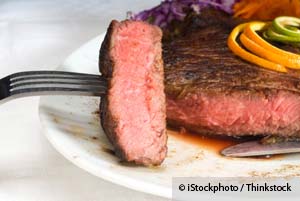 Eating your steak with a side of potatoes and beans may be one way to
reduce the colon cancer risk that comes with eating red meat findings
from a new study suggests the "resistant" starch, found in root
vegetables, grains and legumes, may reverse some of the damaging effects
of red meat on cells.
Eating your steak with a side of potatoes and beans may be one way to
reduce the colon cancer risk that comes with eating red meat findings
from a new study suggests the "resistant" starch, found in root
vegetables, grains and legumes, may reverse some of the damaging effects
of red meat on cells.Researchers looked at23 healthy study participants who were randomly assigned to eat either about 0.6 lbs. (300 grams) of red meat per day for four weeks, or the same diet with the addition of 0.1 lbs. (40 grams) of resistant starch per day. Resistant starches are carbohydrates that go undigested in the small intestine, and later get fermented by bacteria in the colon. After a break, the participants switched diets, so everyone spent four weeks on each diet during the study.
 The researchers found that eating the diet high in red meat changed
levels of a type of genetic material called microRNA in rectal tissue.
Specifically, the scientists found an increase in certain microRNAs
linked to colon cancer. [Cancer-Fighting Diet: 6 Tips to Reduce Your Risk]
The researchers found that eating the diet high in red meat changed
levels of a type of genetic material called microRNA in rectal tissue.
Specifically, the scientists found an increase in certain microRNAs
linked to colon cancer. [Cancer-Fighting Diet: 6 Tips to Reduce Your Risk]However, adding resistance starch to the diet mitigated some of this increase, according to a study published today (Aug. 4) in the journal Cancer Prevention Research.
"Red meat and resistant starch have opposite effects on the colorectal cancer-promoting microRNAs," study author Karen Humphreys, a researcher at Flinders University in Adelaide, Australia, said in a statement. "This finding supports consumption of resistant starch as a means of reducing the risk associated with a high red-meat diet."
Colon cancer develops in the cells lining the inside of the colon and rectum, often beginning as a polyp, but then growing into a cancerous tumor. Consuming too much alcohol, smoking and not exercising are among risk factors for colon cancer.
Studies have found that people who eat a lot of red meat are more likely to develop colon cancer, whereas those who eat a lot of fiber appear to have a reduced risk of the cancer.
 Further research is needed to determine whether a diet high in
resistant starch results in a lower risk of actually developing cancer.
But there is reason to think that eating resistant starch does bring
such a benefit. When it is broken down, starch transforms into compounds
called butyrates, which are important for cells' metabolism. Lab
studies have found butyrates affect colon cancer cells by altering their
microRNAs, which in turn regulate gene expression.
Further research is needed to determine whether a diet high in
resistant starch results in a lower risk of actually developing cancer.
But there is reason to think that eating resistant starch does bring
such a benefit. When it is broken down, starch transforms into compounds
called butyrates, which are important for cells' metabolism. Lab
studies have found butyrates affect colon cancer cells by altering their
microRNAs, which in turn regulate gene expression.The researchers noted that the amount of red meat people ate during the study may exceed levels consumed by many people in the general population, but the amount of resistant starch used in the study was realistic. For the study, the researchers used a supplement of starch, but resistant starch can be found in many natural foods.
"Good examples of natural sources of resistant starch include bananas that are still slightly green, cooked and cooled potatoes [such as those in potato salad], whole grains, beans, chickpeas, and lentils. Scientists have also been working to modify grains such as maize so they contain higher levels of resistant starch," Humphreys said.